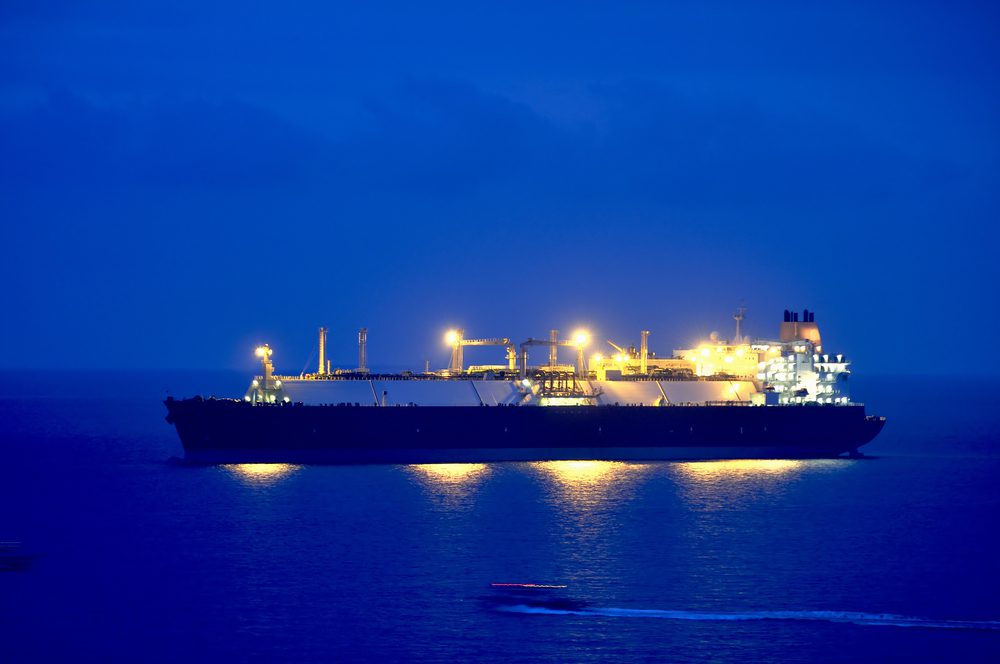By Oleksandr Kalinichenko / Shutterstock
By Anna Shiryaevskaya and Francois de Beaupuy (Bloomberg) — Total SA’s billion-dollar deal to buy liquefied natural gas assets from Engie SA shows how much size matters in the industry.
After Royal Dutch Shell Plc’s takeover of BG Group Plc last year, industry consultant Wood Mackenzie Ltd. says the latest accord is evidence that the biggest energy companies with access to large volumes of diverse supplies will continue to dominate, even as commodity traders from Glencore Plc to Trafigura Group Pte are expanding.
Trade in the $90 billion market for the superchilled gas is poised to double by 2040, underpinned by surging demand from Pakistan to China to generate power instead of burning dirtier coal. The biggest advantage integrated energy companies have is that they own the chain from gas fields to cooling terminals and giant ships crisscrossing the oceans.
“Because of their scale, scope and flexibility” such players are “best positioned to serve emerging market buyers with complex needs,” Frank Harris, vice president for LNG consulting at Wood Mackenzie in Edinburgh, said by email.
Since the Shell-BG deal, prices for fuel to Japan, the biggest consumer, fell to the lowest level since 2005. Rates have more than halved since a 2012 peak as a glut may linger until at least early next decade. Engie is exiting LNG to reduce its exposure to commodity price swings, focus on downstream gas operations, energy-efficiency services and renewables.
“Shell took BG at a time when market prices were very high,” Philippe Sauquet, head of Total’s gas, renewables and power business, said in an interview on Thursday in Paris. “We’re seizing the opportunity to grow at a time when prices are low. This is the right timing for us.”
While Japan, South Korea and China will remain the biggest buyers, suppliers are targeting new markets in Asia and the Middle East. Combined demand from emerging nations will surge to as much as 61 million tons a year by 2030 from about 3.2 million tons last year, or about 12 percent of the global market, according to Bloomberg New Energy Finance.
“All eyes are on emerging players right now, all traders are looking at new markets that can be opened,” said Jean-Christian Heintz, who was in the LNG trading industry for nine years before founding Wideangle LNG, an industry consultant in Lugano, Switzerland. “The big advantage Total has is its upstream oil and gas position.”
The capital intensive nature of LNG also means international and national oil companies will dominate because they probably have an easier job financing multi-billion dollar projects than trading houses, said Claudio Steuer, director of SyEnergy Ltd., a Poole, England-based energy consultant.
With Engie’s assets and its own growth strategy, Total will double output, quadruple trading volumes and control as much as 10 percent of the market by 2020. That will give the company more credibility, Sauquet said.
Read more about the $1.49 billion deal here
Total will inherit some of Engie’s U.S. LNG supplies, which have flexibility such as where they can be delivered, BNEF’s analyst Maggie Kuang said in a note on Monday. And with more than 70 percent of the volumes uncontracted, selling that in an oversupplied market may be a challenge.
The French company will have a bigger impact on the expanding spot market, where cargoes are traded at short-term contracts rather than locked in decades-long deals, Kuang said.
LNG History
LNG trading began more than five decades ago, as Engie’s predecessor Gaz de France SA pioneered deals to bring the fuel across the Mediterranean from Algeria. Since then, it’s become much more complex and is no longer just about moving cargoes from A to B. Traders are constantly rerouting and swapping shipments from one continent to another.
And that’s where the commodities houses come in. Gunvor Group Ltd. will expand with a deal to buy all supply from a project off Equatorial Guinea. Trafigura plans to build a second import terminal in Pakistan. Glencore said last month it has “ appetite for investments” after entering the market four years ago.
Modern LNG trading means that cargoes may be bought multiple times before they reach the final customer, akin to how the oil market has worked for decades. But Total isn’t afraid of increasing competition.
“In oil trading, we’re one of the main players, with nothing to envy from Trafigura, Glencore and others who are interested today in LNG trading,” Sauquet said. “We’ve been in LNG trading for at least 10 years, so we don’t have to fear this competition.”
© 2017 Bloomberg L.P

 Join The Club
Join The Club











